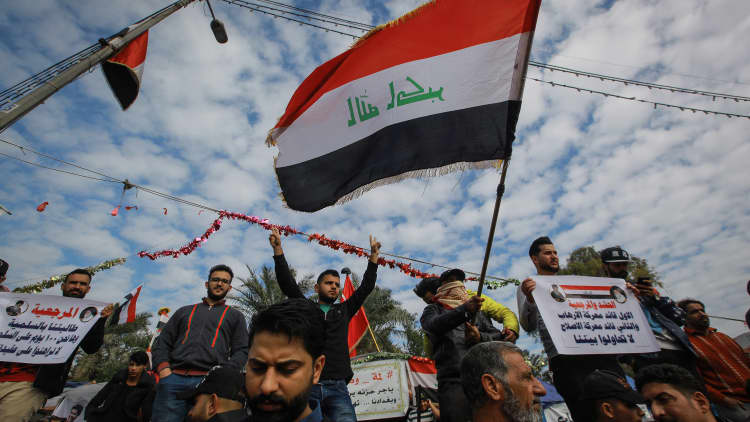The chairman of the House Foreign Affairs Committee on Friday blasted the Trump administration for claiming in a new report that it had authority to order the controversial killing last month of Iranian Gen. Qasem Soleimani in Iraq under Congress' authorization in 2002 for the use of military force against Iraq.
Rep. Eliot Engel, D-N.Y., the committee's chairman, argued that the administration's new report to Congress about the Jan. 3 attack on Soleimani "directly contradicts the President's false assertion that he attacked Iran to prevent an imminent attack against United States personnel and embassies."
"The administration's explanation in this report makes no mention of any imminent threat and shows that the justification the President offered to the American people was false, plain and simple," said Engel in a prepared statement.
He and other Democrats already were skeptical about President Donald Trump's legal rationale for the attack without prior authorization from Congress.
The administration's report made public Friday says that Trump "directed this action in response to an escalating series of attacks in preceding months by Iran and Iran-back militias on United States forces and interests in the Middle East region."
The report also said that the attack on Soleimani at Baghdad's airport was "consistent with" a "longstanding interpretation of the President's authority" under both Article II of the Constitution and the 2002 authorization of use of force in Iraq.
Engel, in his statement, called that argument "absurd."
"To make matters worse, to avoid having to justify its actions to Congress, the administration falsely claims Congress had already authorized the strike under the 2002 Iraq war resolution," Engel said.
"This legal theory is absurd. The 2002 authorization was passed to deal with Saddam Hussein," he said. "This law had nothing to do with Iran or Iranian government officials in Iraq."
The chairman added, "To suggest that 18 years later this authorization could justify killing an Iranian official stretches the law far beyond anything Congress ever intended. I was pleased to join many of my colleagues in voting to repeal the outdated Iraq war authorization, and I hope the Senate will follow suit."
In its report, the administration said the purpose of the attack on Soleimani was "to protect United States personnel, to deter Iran from conducting or supporting further attacks against United States forces and interests, to degrade Iran's and [its] Qods Force-backed militias' ability to conduct attacks, and to end Iran's strategic escalation of attacks on, and threats to U.S. interests."
At the time of his death, Soleimani, 62, was commander of Iran's Quds Force, the foreign operations wing of the elite paramilitary Islamic Revolutionary Guard Corps.
Trump administration officials said after the strike that Soleimani had been planning imminent attacks on Americans and as a result had to be stopped.
A week after his killing, Secretary of State Mike Pompeo said, "There was no doubt that there were a series of imminent attacks that were being plotted by Qasem Soleimani."
But Pompeo, in an interview with Fox News, added, "We don't know precisely when and we don't know precisely where, but it was real," Pompeo said in an interview that aired Thursday night on Fox News.
NBC News reported in mid-January that Trump authorized Soleimani's killing seven months before he actually was killed.
"The presidential directive in June came with the condition that Trump would have final signoff on any specific operation to kill Soleimani," NBC reported, citing five current and former senior administration officials.
NBC News noted that the timing of that directive "could undermine" the administration's already publicly stated rationale for the killing.

The administration's report on Friday said that Article II of the Constitution empowers the president, as commander in chief, "to direct the use of military force to protect the Nation from an attack or threat of imminent attack and to protect important national interests."
"Article II thus authorized the President to use force against the forces of Iran, a state responsible for conducting and directing attacks against United States forces in the region," the report argued.
The report also said that under the 2002 Authorization for Use of Military Force Against Iraq, the president has the power to use American military forces "as he determines to be necessary and appropriate" in order to defend U.S. national security against the threat posed by Iraq.
While Iraq's late leader Saddam Hussein was the initial focus of that statute, the report notes, the statute long has been used to "authorize the use of force for the purpose of establishing a stable, democratic Iraq and addressing terrorist threats emanating from Iraq."
Such uses of force can address "threats to the United States posed by militias, terrorist groups, or other armed groups in Iraq," the report said.


